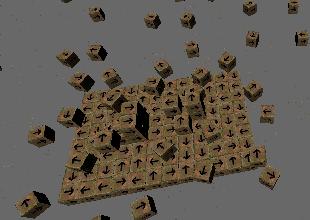
Self-Organizing Collective Intelligence for Adaptive Problem Solving
NSF ITR Project IIS-0325098 (2003-2009)
Principal Investigator
James Reggia, Professor, UMCP
Participating Graduate Students
Project Information
The goal of this project is to give self-organizing systems,
such as collections of very simple reactive agents that move collectively,
the ability to also solve problems. To do this, the agents are given
a small amount of working memory and simple goal stacks.
The resulting collection of agents, which are still primarily driven
by reactive behaviors, have sufficient direction that we refer to
them as exhibiting "guided self-organization". Among the specific topics
we have examined are search-and-retrieve problems, logistics problems,
self-assembly, self-replication, and diagnostic inference.
Project Abstract
Publications
The Movie
A simple demonstration of a
simulated self-assembling building illustrates
the basic concept of self-organization. In this example,
a collection of blocks, each block being an independent
agent that can only see other blocks nearby, effectively
"grow" a house. There is no central controller here, and
no master blueprint. No block has a pre-assigned final position -
blocks look for local patterns that they recognize, and when
a block finds such a pattern it deposits itself there.
The movie is about two minutes long, and is excerpts
from a longer process.
Last updated July 2008


